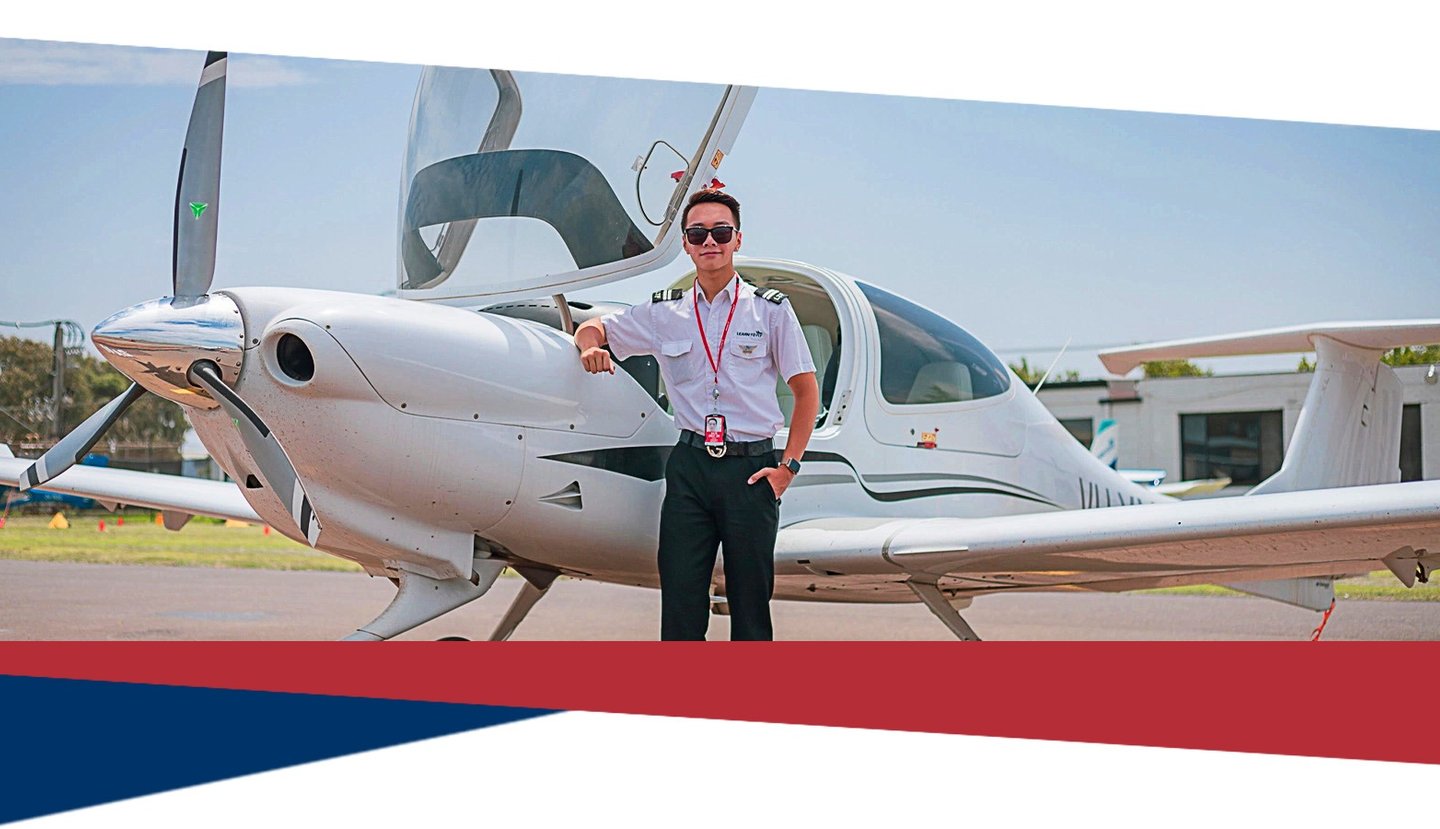How to Become a Pilot: The Ultimate Beginner's Guide
7 min read


Becoming a pilot is a dream for many, but understanding the steps involved can feel overwhelming. This guide by Global Aviations will walk you through the journey, from understanding eligibility to selecting the right training program and starting your career in aviation.
How to Become a Pilot: The Ultimate Beginner's Guide
Becoming a pilot is an ambitious dream that attracts many aviation enthusiasts, yet the journey can seem daunting at first. This comprehensive guide by Global Aviations is designed to simplify the process, breaking it down into manageable steps. It will help you understand the essential eligibility requirements, such as age and educational background, and assist you in selecting the right training program that aligns with your career goals. From obtaining the necessary medical certificates to choosing between different types of pilot licenses, this guide ensures you’re well-informed at every stage. With the right preparation and dedication, you can confidently embark on your path to a rewarding career in aviation. So, take the first step today and let your dream of flying take flight!
1. Understand the Basic Eligibility Criteria ✅
Before starting your journey, ensure you meet the minimum requirements:
Age: Typically, you need to be at least 17 years old to start pilot training.
Education: A high school diploma (or equivalent) is required, with a strong foundation in physics and mathematics.
Medical Fitness: Obtain a Class 1 Medical Certificate from an aviation medical examiner.
Before embarking on your journey to become a pilot, it is crucial to meet certain minimum requirements. First, you typically need to be at least 17 years old to begin your pilot training. Additionally, having a high school diploma or equivalent is essential, along with a solid understanding of physics and mathematics, which are vital subjects for flying. Lastly, you must obtain a class 1 medical certificate from an approved aviation medical examiner to ensure that you are medically fit for the responsibilities of piloting an aircraft. Meeting these criteria will pave the way for a successful career in aviation.
2. Choose the Right Pilot License 🎓
Different licenses open up various career opportunities. Select the one that aligns with your goals:
Private Pilot License (PPL): For personal or recreational flying.
Commercial Pilot License (CPL): Required to work as a professional pilot.
Airline Transport Pilot License (ATPL): Necessary to become a captain in commercial airlines.
Obtaining a pilot license can significantly enhance your career prospects in the aviation industry. If you enjoy personal flying, a Private Pilot License (PPL) may be the right choice, allowing you to soar the skies for leisure. For those aspiring to become professional pilots, the Commercial Pilot License (CPL) is essential, enabling you to undertake paid flying jobs and build valuable flight experience. Ultimately, if your ambition is to command a commercial airline, you will need an Airline Transport Pilot License (ATPL), the highest level of pilot certification. By understanding the differences between these licenses and selecting the one that aligns with your career goals, you can pave your way in the dynamic field of aviation.
3. Research and Select a Pilot Training Program 🌏
Look for accredited pilot schools with excellent facilities and experienced instructors. At Global Aviations, we offer world-class training programs with a proven track record of success. Factors to consider:
📍 Location (domestic or abroad).
💰 Cost of training and living expenses.
🎓 Opportunities for scholarships and financial aid.
⭐ Reputation and placement record of the institution.
When seeking accredited pilot schools, it's essential to prioritize those with outstanding facilities and experienced instructors. Global Aviations stands out by offering world-class training programs that boast a proven track record of success. Consider the location of the school, whether you prefer a domestic or international setting, as this can significantly impact your training experience. Additionally, evaluate the cost of training alongside living expenses to ensure that the program fits your budget. Look for opportunities for scholarships and financial aid, as this can alleviate financial burdens. Finally, research the school's reputation and placement record to ensure it aligns with your career ambitions. Choosing the right institution will set the foundation for your future in aviation.
4. Begin Ground School and Flight Training 🚀
Pilot training has two main components:
📖 Ground School: Learn aviation theory, including aerodynamics, navigation, meteorology, and regulations.
🛩️ Flight Training: Gain practical experience by flying under the supervision of an instructor.
Pilot training consists of two essential components that prepare aspiring aviators for their future careers. The first component is ground school, where students engage in intensive study of aviation theory. This includes critical subjects such as aerodynamics, navigation, meteorology, and the various regulations governing air travel. The knowledge gained in ground school serves as the foundation for a pilot's understanding of flight principles and safety procedures. The second component is flight training, which provides hands-on experience in an actual aircraft. Under the careful supervision of a qualified instructor, students apply the theoretical knowledge acquired in ground school and develop their flying skills. Together, these components ensure that future pilots are well-equipped to navigate the complexities of aviation and maintain high standards of safety and professionalism in the sky.
5. Pass the Required Exams 📝
To earn your pilot license, you’ll need to pass:
✅ Written exams on aviation knowledge.
🛬 Practical flying tests (checkrides) with an authorized examiner.
To earn your pilot license, you must successfully navigate a few essential challenges. First, you will need to demonstrate your understanding of aviation knowledge through written exams, which cover various topics such as aerodynamics, navigation, and regulations. These exams are crucial in ensuring that you possess the theoretical foundation necessary for safe flying. Next, you will undergo practical flying tests, commonly known as checkrides, with an authorized examiner. During these checkrides, you must showcase your flying skills, decision-making abilities, and overall competency in real-world scenarios. Both the written exams and practical tests are vital components of the licensing process, helping to ensure that all pilots meet the high standards required for aviation safety. With determination and preparation, you can achieve your goal of becoming a licensed pilot.
6. Build Flight Hours ⏱️
Flight experience is crucial for advancing your career. For example:
PPL: Requires around 40 hours of flight time.
CPL: Requires 200-250 hours of flight time (varies by country).
Flight experience is a pivotal component in the journey of advancing one's aviation career. For aspiring pilots, obtaining a Private Pilot License (PPL) typically necessitates approximately 40 hours of flight time, providing the foundational skills and knowledge required to operate an aircraft. Building on this, those aiming for a Commercial Pilot License (CPL) need to accumulate between 200 to 250 hours of flight time, with the exact requirements varying by country. This accumulation of flight hours not only enhances a pilot's technical abilities but also fosters confidence and decision-making skills essential for professional aviation. Thus, dedicating time to gain flight experience is indispensable for pilots looking to elevate their careers within the industry.
7. Specialize and Gain Certifications 🏅
Depending on your career goals, consider additional certifications, such as:
🌫️ Instrument Rating (IR): To fly in low visibility conditions.
🚀 Multi-Engine Rating (MER): To operate aircraft with multiple engines.
As you navigate your aviation career, it is essential to align your training with your specific goals. Obtaining an Instrument Rating (IR) allows you to master flying in low visibility conditions, enhancing your skills and versatility as a pilot. This certification is crucial for those aiming to operate in diverse weather scenarios. Additionally, pursuing a Multi-Engine Rating (MER) equips you with the capability to handle aircraft with multiple engines, opening up further opportunities in commercial aviation and beyond. By strategically pursuing these certifications, you can significantly advance your qualifications and expand your career possibilities, ensuring you are well-prepared for various flight operations.
8. Start Your Career 🌟
Once you’ve earned your license and built sufficient hours, you can:
🛫 Apply for jobs with airlines, cargo operators, or private aviation companies.
🚀 Continue training to achieve advanced roles, such as captain.
After earning your license and accumulating the necessary flight hours, a world of opportunities opens up before you. You can apply for positions with various airlines, cargo operators, or private aviation companies, embarking on an exciting career in aviation. Each role presents unique challenges and experiences that can enhance your skills and knowledge in the field. Furthermore, if you aspire to climb the ladder in your aviation career, you can choose to continue your training to achieve advanced roles, such as becoming a captain. This path not only allows for career progression but also provides the chance to take on greater responsibilities and lead a team, ultimately fulfilling your dreams in the sky.
Why Choose Global Aviations? 🌍
At Global Aviations, we are committed to helping aspiring pilots achieve their dreams. Here’s what sets us apart:
Comprehensive Training Programs: Covering everything from ground school to advanced certifications.
Experienced Instructors: Learn from industry experts with decades of experience.
Job Placement Assistance: We help our graduates secure positions with top airlines globally.
State-of-the-Art Facilities: Train with cutting-edge technology and modern aircraft.
At Global Aviations, we are dedicated to empowering aspiring pilots to realize their dreams. Our comprehensive training programs cater to every stage of the pilot journey, from foundational ground school to advanced certifications essential for success in the industry. Students benefit from the expertise of our experienced instructors, who bring decades of industry knowledge and insights to the classroom. Moreover, we provide robust job placement assistance, ensuring our graduates find positions with leading airlines around the world. With state-of-the-art facilities, equipped with the latest technology and modern aircraft, we create an ideal learning environment that prepares our pilots for the challenges of the sky. Join us at Global Aviations, where your aviation aspirations take flight!
Tips for Aspiring Pilots 🛫
🩺 Stay Fit: Maintain good health to meet medical requirements.
🌐 Network: Connect with aviation professionals for guidance and opportunities.
📖 Stay Updated: Keep up with advancements in aviation technology and regulations.
For aspiring pilots, there are several key tips to keep in mind as you embark on this exciting journey. First and foremost, staying fit is crucial; maintaining good health will not only help you meet the necessary medical requirements, but it will also prepare you for the physical demands of flying. Networking is another vital aspect; connecting with aviation professionals can provide invaluable guidance and open doors to various opportunities in the field. Additionally, it's essential to stay updated on the latest advancements in aviation technology and regulations. By committing to these practices, you can set yourself on a path toward a successful and fulfilling career in aviation.
Final Thoughts ✈️
Becoming a pilot requires dedication, hard work, and a clear plan. By following these steps and choosing the right training partner, you can achieve your dream of flying the skies. At Global Aviations, we are here to guide you every step of the way.
Explore our pilot training programs today and take the first step toward an exciting career in aviation!
Becoming a pilot is an exhilarating journey that demands commitment and careful planning. At Global Aviations, we understand the significance of this pursuit and are dedicated to supporting aspiring pilots throughout their training. With a range of pilot training programs designed to cater to various needs, we ensure that you receive the best possible guidance and resources. By choosing us as your training partner, you can confidently navigate the path to achieving your dream of soaring through the skies. Explore our programs today, and take that crucial first step towards a rewarding career in aviation, where the sky truly is the limit!


Elevate your career with our pilot training.
STAY TUNED!
© 2025. All rights reserved.

Pilot Training Programs
FAQs
How to Become a Pilot
How can I become a pilot after 12th
What is the Salary of a Pilot
FAQs
